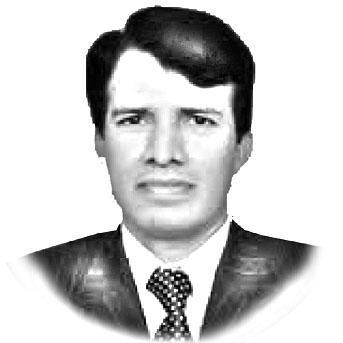Dr Muhammad Khan
THERE exists a misperception whether International Criminal Court (ICC) has the jurisdiction to try the Indian nationals, involved in the cases like; crimes of genocide, crimes against humanity and war crimes in Indian Illegally Occupied Jammu and Kashmir (IIOJ&K). Indeed, ICC is the world’s only permanent international court having the mandate to investigate and prosecute individuals from any state who are involved in the international atrocity, crimes of genocide, crimes against humanity, and war crimes. This confusion has been created deliberately by Indian lobby that since India is not the member of ICC; therefore Indian nationals who commit such crimes against humanity cannot be tried at ICC. This is true that, India did not sign the Rome Statute; therefore it is not a member of ICC. Nevertheless, people of India (Indian nationals) if found involved in such heinous crimes can be tried by ICC by all means. Unlike United Nations Organs, ICC does not prosecute state(s) rather it prosecute individuals, who commit crimes through a well-established mechanism.
Since India is not a signatory of the Rome Statute, thus there would be an indirect mechanism adopted for the prosecution of such personnel by ICC. The laid-down procedure for the trial of individuals from such a country which is not member of ICC is through indirect reference of United Nations Security Council (UNSC). In such a case, if an individual or group of individuals found involved in crimes against humanity as mentioned above, UNSC will refer the case to ICC. “The Security Council may refer a situation to the ICC, which empowers the ICC to investigate all four crimes under the Rome Statute, including crimes of aggression.” This provision dispels the confusion, calculatingly propagated by Indian media and its officials to protect thousands of Indian national who have committed crimes against humanity in IIOJ&K since last three decades. In fact, ICC is not part of United Nations, yet it has the mandate to ‘investigate and prosecute’ those personnel who commits such crimes as the world’s only permanent international court. ICC was established by the Rome Statute, which was negotiated within United Nations for creation of an independent judicial body distinct from the UN. Later the UN Diplomatic Conference of Plenipotentiaries on the Establishment of an International Criminal Court adopted the Statute. This is how ICC has been linked to UN without being its permanent organ.
While scrutinizing the prosecution of Indian nationals, who have committed crimes in IIOJ&K since last three decades, let’s debate three broad categories of crimes. First; those Indian nationals, particularly the Indian Army and paramilitary forces, committed acts of genocide in IIOJ&K with a clear intent to target the Muslims. ICC Statutes defines genocide as. “committed with intent to destroy, in whole or in part, a national, ethnical, racial or religious group”. In IIOJ&K Indian security forces have targeted the Muslim population through all possible means. Besides killing of over 100,000 Kashmiris, the Muslim community of IIOJ&K have been caused serious bodily and mental harm in torture centres and at military camps, established in population centres and urban areas of the state. ICC follows this definition of genocide as it was defined in UN Convention on the Prevention and Punishment of the Crime of Genocide-1948. In a way, there are two applications for the trail of Indian security forces personnel. The ICC defines the crimes against humanity as; “committed as part of a widespread or systematic attack directed against any civilian population.” The civilian population of IIOJ&K have undergone the acts of murders, mass murders, torture, rapes and gang-rapes, imprisonment, enforced disappearances and other inhumane acts of a similar nature intentionally by Indian security forces as a state policy of India in the occupied state. There is a total impunity for the members of security forces of India through draconian laws like Armed Forces Special Power (AFSP) Act and Public Safety Act (PSA). Under the cover of these discriminatory and inhuman laws, Indian security forces have caused great sufferance to the majority Muslim population of IIOJ&K.
Debating the war crimes, it is worth mentioning that, through deployment of over 900,000 security forces in IIOJ&K, the occupied state is a war zone since the popular uprising of the Kashmiris in 1990. These Indian war crimes are serious breaches of the Geneva Conventions of 12 August 1949 and all other international laws and customs which are applicable in armed conflicts. The rules of war and conflicts are governed by Geneva Conventions-1949. Indeed, Geneva Conventions-1949 emphasized on the protection of ‘civilian population’but in IIOJ&K Indian security forces are targeting the unarmed civilian population through illegal and brutal acts of the war crimes. Geneva Conventions and other treaties of war and conflict do not allow any army to; kill, attack or harm the non-combatants and civilians in the war and conflict zones. India is still committing war crimes in IIOJ&K in violation of all international treaties and agreements. Indeed, there has been wilful killing, torture, inhuman treatment, wilfully causing great suffering, serious injuries and torture to civilian population of IIOJ&K at the hands of Indian security forces which all comes under the war crimes. Despite passage of seven decades, the Kashmir dispute is still pending unresolved at United Nations. The grave human right violations, the serial killings of Kashmiris, the act of genocide, crimes against humanity and war crimes committed by Indian security forces in last three decades warrants that United Nations Security Council (UNSC) must refer the case to ICC to prosecute all those men and officers of Indian security forces who committed these crimes. Though this is the legal responsibility of UNSC to devise and adopt all possible ways for the resolution of Kashmir dispute and its referral to International Criminal Court (ICC) yet the Government of Pakistan must approach this world body for the initiation of this much awaited aspect sooner than later.
— The writer is Professor of Politics and IR at International Islamic University, Islamabad.










